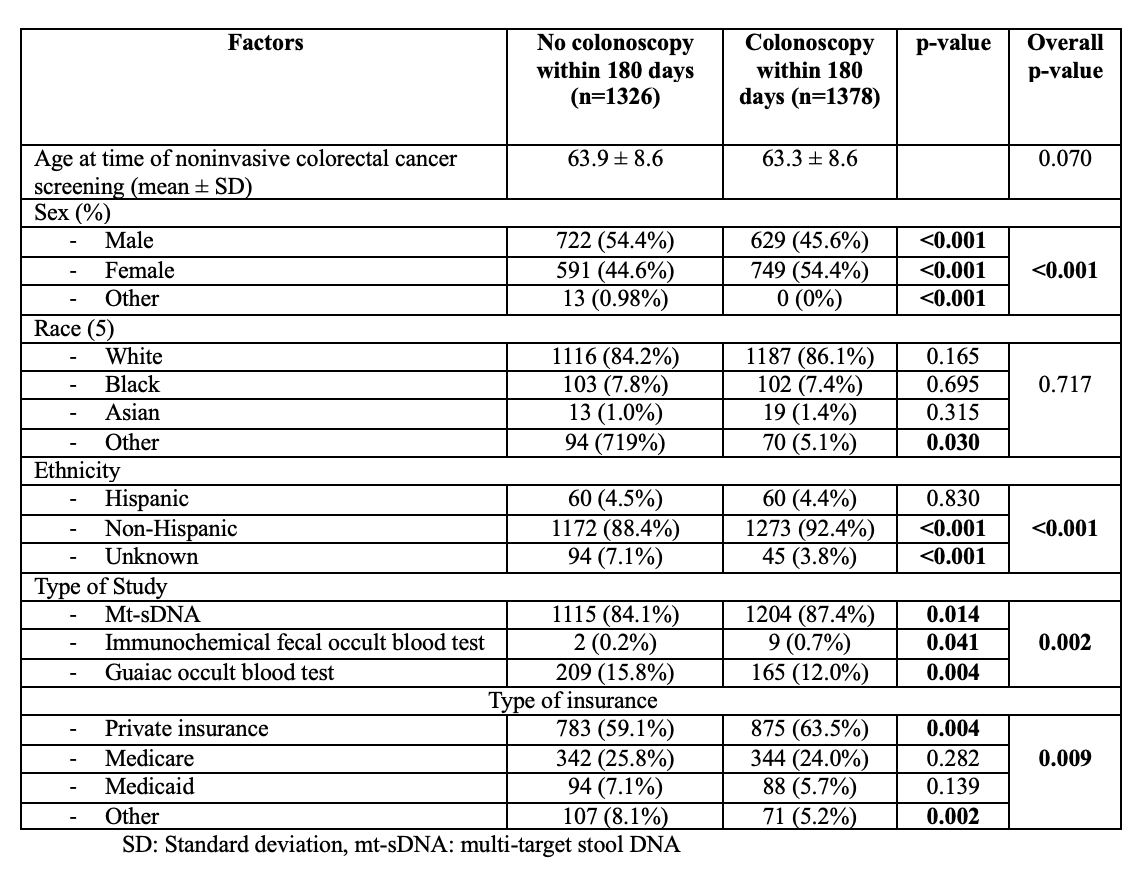Tuesday Poster Session
Category: Colorectal Cancer Prevention
P4762 - Low Rates of Colonoscopy Follow-Up After Positive Non-Invasive Stool Tests at a Tertiary Care Hospital
Tuesday, October 28, 2025
10:30 AM - 4:00 PM PDT
Location: Exhibit Hall

Zehra Naseem, MD (she/her/hers)
Cleveland Clinic
Cleveland, OH
Presenting Author(s)
Zehra Naseem, MD1, Mohamad Mahdi Osman, DO1, Kailash Singh, 2, Timothy Ring, Jr., 2, Carole Macaron, MD1
1Cleveland Clinic, Cleveland, OH; 2Cleveland Clinic Lerner College of Medicine, Cleveland, OH
Introduction: Timely follow-up colonoscopy after a positive noninvasive stool-based screening test is critical to the effectiveness of colorectal cancer screening, as it enables early detection and intervention. This study aimed to evaluate the rates of follow-up colonoscopy within 180 days of a positive stool test and to characterize the demographic profiles of patients who did and did not complete the follow-up procedure.
Methods: This descriptive study was conducted at the Cleveland Clinic and included patients aged 45 to 75 with a positive noninvasive stool-based screening test between August 1, 2023, and August 1, 2024. The tests evaluated were the guaiac-based fecal occult blood test (gFOBT), fecal immunochemical test (FIT), and multi-target stool DNA (mt-sDNA). We assessed whether patients completed a follow-up colonoscopy within 180 days of the positive result and analyzed demographic differences between those who did and did not complete the procedure. Outcomes were reported as percentages, with a p-value < 0.05 considered statistically significant.
Results: Of the 4,346 patients with a positive stool-based screening test, 1,642 were excluded due to insufficient follow-up time (< 180 days remaining in the study period). The final analysis included 2,704 patients. Among these, only 1,378 (50.96%) underwent a follow-up colonoscopy within 180 days of the positive test. For those who completed the colonoscopy, the mean time to the procedure was 54.32 ± 38.76 days. mt-sDNA was the most used test (85.8%). Patients who completed colonoscopy within 180 days were more likely to be female, non-Hispanic, have undergone mt-sDNA or FIT rather than gFOBT, and have private insurance (Table 1).
Discussion: Our results show that colonoscopy completion following a positive noninvasive stool test is only 50%, well below the 80% benchmark recommended by the US Multi-Society Task Force. Significant disparities were observed by sex, ethnicity, stool-based test type, and insurance status. Comprehensive, multi-level interventions are needed to address barriers at the patient, provider, and institutional levels.

Figure: Table 1: Characteristics of Patients With and Without Follow-Up Colonoscopy Within 180 Days After a Positive Stool Test
Disclosures:
Zehra Naseem indicated no relevant financial relationships.
Mohamad Mahdi Osman indicated no relevant financial relationships.
Kailash Singh indicated no relevant financial relationships.
Timothy Ring, Jr. indicated no relevant financial relationships.
Carole Macaron indicated no relevant financial relationships.
Zehra Naseem, MD1, Mohamad Mahdi Osman, DO1, Kailash Singh, 2, Timothy Ring, Jr., 2, Carole Macaron, MD1. P4762 - Low Rates of Colonoscopy Follow-Up After Positive Non-Invasive Stool Tests at a Tertiary Care Hospital, ACG 2025 Annual Scientific Meeting Abstracts. Phoenix, AZ: American College of Gastroenterology.
1Cleveland Clinic, Cleveland, OH; 2Cleveland Clinic Lerner College of Medicine, Cleveland, OH
Introduction: Timely follow-up colonoscopy after a positive noninvasive stool-based screening test is critical to the effectiveness of colorectal cancer screening, as it enables early detection and intervention. This study aimed to evaluate the rates of follow-up colonoscopy within 180 days of a positive stool test and to characterize the demographic profiles of patients who did and did not complete the follow-up procedure.
Methods: This descriptive study was conducted at the Cleveland Clinic and included patients aged 45 to 75 with a positive noninvasive stool-based screening test between August 1, 2023, and August 1, 2024. The tests evaluated were the guaiac-based fecal occult blood test (gFOBT), fecal immunochemical test (FIT), and multi-target stool DNA (mt-sDNA). We assessed whether patients completed a follow-up colonoscopy within 180 days of the positive result and analyzed demographic differences between those who did and did not complete the procedure. Outcomes were reported as percentages, with a p-value < 0.05 considered statistically significant.
Results: Of the 4,346 patients with a positive stool-based screening test, 1,642 were excluded due to insufficient follow-up time (< 180 days remaining in the study period). The final analysis included 2,704 patients. Among these, only 1,378 (50.96%) underwent a follow-up colonoscopy within 180 days of the positive test. For those who completed the colonoscopy, the mean time to the procedure was 54.32 ± 38.76 days. mt-sDNA was the most used test (85.8%). Patients who completed colonoscopy within 180 days were more likely to be female, non-Hispanic, have undergone mt-sDNA or FIT rather than gFOBT, and have private insurance (Table 1).
Discussion: Our results show that colonoscopy completion following a positive noninvasive stool test is only 50%, well below the 80% benchmark recommended by the US Multi-Society Task Force. Significant disparities were observed by sex, ethnicity, stool-based test type, and insurance status. Comprehensive, multi-level interventions are needed to address barriers at the patient, provider, and institutional levels.

Figure: Table 1: Characteristics of Patients With and Without Follow-Up Colonoscopy Within 180 Days After a Positive Stool Test
Disclosures:
Zehra Naseem indicated no relevant financial relationships.
Mohamad Mahdi Osman indicated no relevant financial relationships.
Kailash Singh indicated no relevant financial relationships.
Timothy Ring, Jr. indicated no relevant financial relationships.
Carole Macaron indicated no relevant financial relationships.
Zehra Naseem, MD1, Mohamad Mahdi Osman, DO1, Kailash Singh, 2, Timothy Ring, Jr., 2, Carole Macaron, MD1. P4762 - Low Rates of Colonoscopy Follow-Up After Positive Non-Invasive Stool Tests at a Tertiary Care Hospital, ACG 2025 Annual Scientific Meeting Abstracts. Phoenix, AZ: American College of Gastroenterology.
